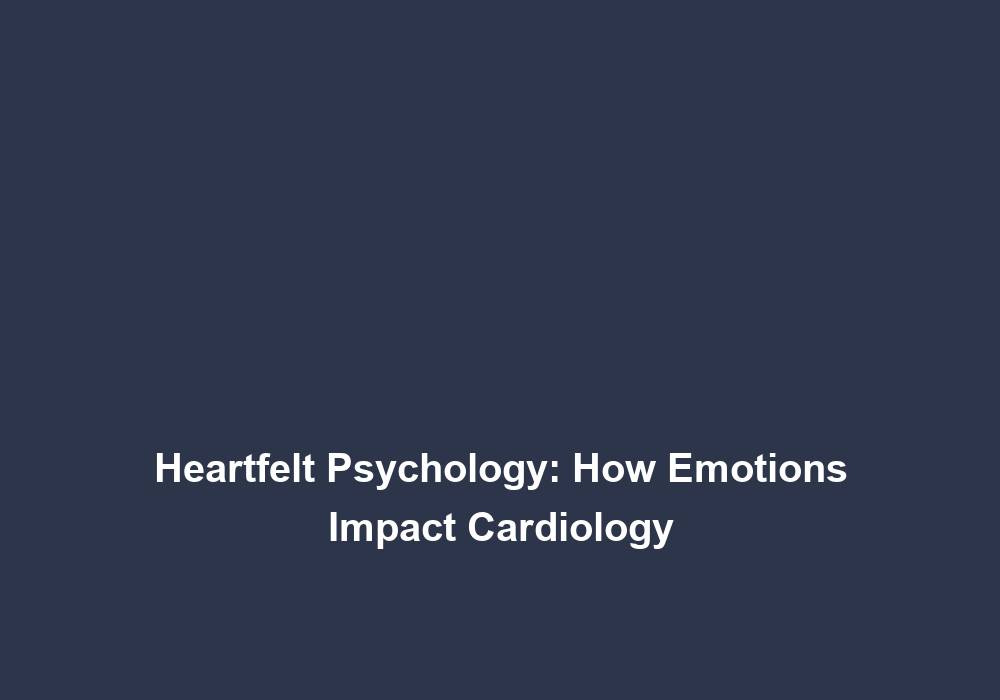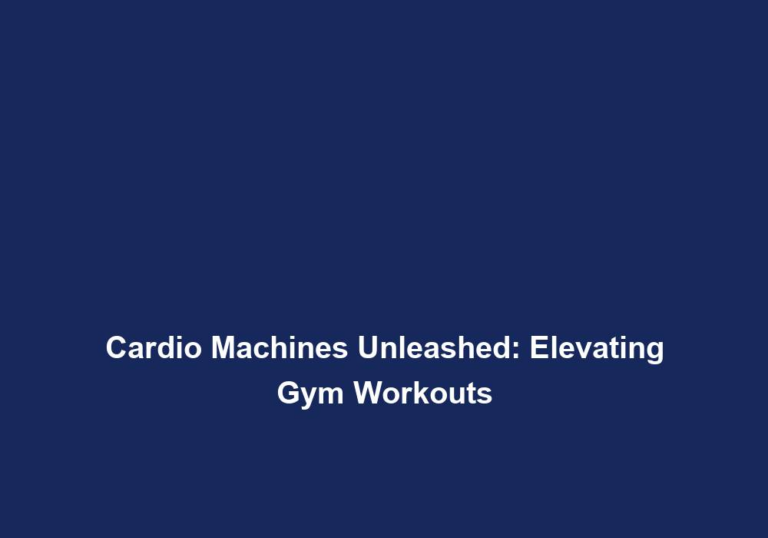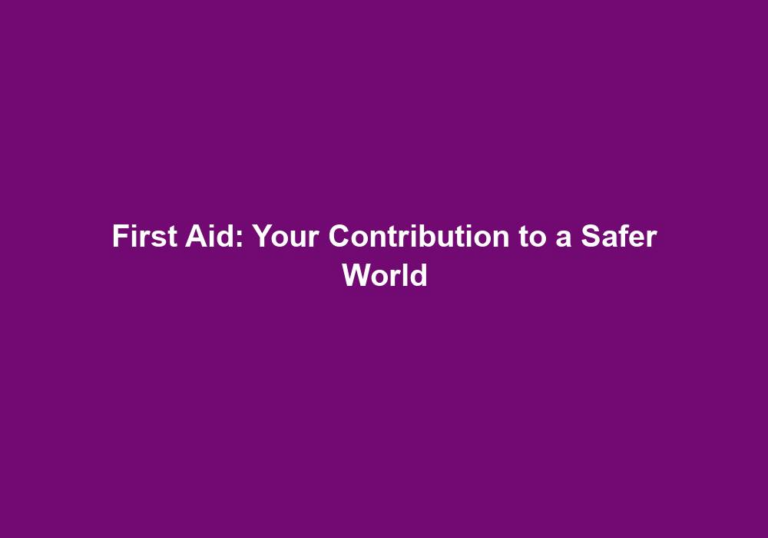Heartfelt Psychology: How Emotions Impact Cardiology
The field of cardiology, which focuses on the study and treatment of heart diseases, has long recognized the powerful connection between our emotions and our heart health. While medical science primarily attributes cardiac problems to physiological causes such as lifestyle, genetics, or age, recent research has shed light on the significant impact of emotions on the cardiovascular system. This emerging field, known as psychocardiology or behavioral cardiology, explores the intricate relationship between our emotional well-being and heart health.
The Mind-Heart Connection
Understanding the Emotional Influence:
It is well-known that emotions such as stress, anxiety, anger, and sadness can have a profound impact on our overall health. However, their influence on the heart is particularly noteworthy. The intricate network of the mind-body connection plays a vital role in determining the physiological response to emotional stimuli.
- Stress: Chronic stress has been shown to increase the risk of developing cardiovascular diseases. When we experience stress, the body’s stress response is activated, leading to the release of stress hormones like cortisol and adrenaline. These hormones can elevate blood pressure, increase heart rate, and promote inflammation, all of which can contribute to heart problems.
- Anxiety: Persistent anxiety can also have detrimental effects on the heart. Anxiety disorders have been associated with an increased risk of heart disease, including coronary artery disease and heart attacks. The constant state of heightened arousal and the release of stress hormones can negatively impact the cardiovascular system.
- Anger: Intense anger can trigger a surge of hormones and neurotransmitters that can lead to a sudden increase in blood pressure and heart rate. This can put additional strain on the heart and increase the risk of cardiovascular events, such as heart attacks and arrhythmias.
- Sadness: Prolonged periods of sadness or depression have been linked to an increased risk of developing heart disease. The exact mechanisms underlying this relationship are still being studied, but it is believed that the physiological changes associated with depression, such as inflammation and impaired immune function, can contribute to heart problems.
Psychological Factors and Heart Disease:
Various psychological factors, including chronic stress, depression, and social isolation, have been linked to an increased risk of developing cardiovascular diseases. Stress, for example, triggers the release of stress hormones like cortisol and adrenaline, which can lead to elevated blood pressure, increased heart rate, and inflammation.
- Chronic Stress: Prolonged exposure to stress can contribute to the development and progression of heart disease. Studies have shown that individuals experiencing chronic stress are more prone to high blood pressure, atherosclerosis, and abnormal heart rhythms. Moreover, stress can also lead to unhealthy coping behaviors like smoking, unhealthy eating habits, and physical inactivity, further increasing the risk of heart problems.
- Depression: Depression is not only a psychological disorder but also a risk factor for heart disease. The relationship between depression and heart health is bidirectional, meaning that depression can increase the risk of heart disease, and individuals with heart disease are more likely to experience depression. Depression is associated with changes in the autonomic nervous system, inflammation, and unhealthy lifestyle behaviors, all of which can contribute to the development of heart problems.
- Social Isolation: Lack of social support and social isolation have been linked to an increased risk of heart disease. People who feel lonely or socially disconnected are more likely to engage in unhealthy behaviors, such as smoking, excessive alcohol consumption, and poor dietary choices. Additionally, social isolation can lead to chronic stress and depression, further exacerbating the risk of heart problems.
Emotional Triggers and Cardiac Events:
Emotional triggers, such as sudden grief, intense anger, or extreme fear, have been associated with acute cardiac events, including heart attacks and arrhythmias. These emotional stressors can disrupt the normal functioning of the heart, leading to potentially life-threatening situations.
- Sudden Grief: The loss of a loved one or a significant life event can trigger intense grief, which can have a profound impact on the heart. The emotional stress experienced during grief can lead to the release of stress hormones, increased blood pressure, and heart rate, and can even cause a temporary disruption in the heart’s electrical system, potentially resulting in a heart attack.
- Intense Anger: Outbursts of anger, especially when they are frequent and intense, can significantly increase the risk of heart problems. Anger triggers the release of stress hormones and activates the sympathetic nervous system, leading to increased blood pressure, heart rate, and blood clotting. These physiological changes can increase the likelihood of a heart attack or stroke.
- Extreme Fear: Intense fear or anxiety can cause a sudden surge of adrenaline, also known as the fight-or-flight response. This response prepares the body to deal with perceived threats by increasing heart rate, blood pressure, and blood flow to the muscles. However, prolonged or frequent activation of the fight-or-flight response can put excessive strain on the heart and increase the risk of cardiac events.
The Role of Stress in Cardiology
Understanding Stress:
Stress is a natural response of the body to demanding or challenging situations. While short-term stress can be beneficial, chronic stress can take a toll on the cardiovascular system. The body’s stress response involves the release of stress hormones, which increase blood pressure and heart rate, narrow blood vessels, and promote inflammation.
- Acute Stress: Acute stress, also known as short-term stress, is a normal and necessary part of life. It helps us respond to immediate threats and challenges, keeping us alert and focused. During acute stress, the body releases stress hormones like adrenaline and cortisol, which prepare the body for action. This physiological response can temporarily increase heart rate and blood pressure, allowing us to respond effectively to the situation.
- Chronic Stress: Chronic stress, on the other hand, refers to prolonged exposure to stressors without adequate recovery time. This type of stress can have detrimental effects on the cardiovascular system. The constant release of stress hormones can lead to persistent high blood pressure, increased heart rate, and chronic inflammation, all of which can contribute to the development of heart disease.
Chronic Stress and Heart Disease:
Prolonged exposure to stress can contribute to the development and progression of heart disease. Studies have shown that individuals experiencing chronic stress are more prone to high blood pressure, atherosclerosis, and abnormal heart rhythms. Moreover, stress can also lead to unhealthy coping behaviors like smoking, unhealthy eating habits, and physical inactivity, further increasing the risk of heart problems.
- High Blood Pressure: Chronic stress can lead to sustained high blood pressure, also known as hypertension. Persistent elevation in blood pressure can damage the walls of the arteries, making them more susceptible to plaque buildup and narrowing. This can increase the risk of heart attacks, strokes, and other cardiovascular events.
- Atherosclerosis: Chronic stress has been associated with the development and progression of atherosclerosis, a condition characterized by the buildup of fatty deposits (plaques) in the arteries. These plaques can restrict blood flow to the heart, leading to chest pain (angina) or complete blockage of blood flow, resulting in a heart attack.
- Abnormal Heart Rhythms: Stress hormones released during chronic stress can disrupt the electrical signals that regulate the heart’s rhythm, leading to arrhythmias. Arrhythmias can cause the heart to beat too fast, too slow, or irregularly, compromising its ability to pump blood effectively.
Managing Stress for Heart Health:
Recognizing and effectively managing stress is crucial for maintaining a healthy heart. Strategies such as regular exercise, mindfulness meditation, deep breathing techniques, and engaging in activities that bring joy and relaxation can help reduce stress levels and promote cardiovascular well-being.
- Regular Exercise: Physical activity has been shown to be an effective stress management tool. Exercise helps reduce the levels of stress hormones in the body, promotes the release of endorphins (feel-good hormones), and improves overall mood. Engaging in activities such as walking, jogging, swimming, or yoga can help alleviate stress and improve heart health.
- Mindfulness Meditation: Mindfulness meditation is a practice that involves focusing one’s attention on the present moment without judgment. This practice has been shown to reduce stress, anxiety, and depression, and improve overall well-being. By incorporating mindfulness into daily life, individuals can develop resilience to stress and improve their cardiovascular health.
- Deep Breathing Techniques: Deep breathing exercises, such as diaphragmatic breathing, can activate the body’s relaxation response and promote a sense of calm. By taking slow, deep breaths and focusing on the breath, individuals can reduce heart rate, lower blood pressure, and counteract the physiological effects of stress.
- Joyful and Relaxing Activities: Engaging in activities that bring joy, relaxation, and a sense of fulfillment can help alleviate stress and promote emotional well-being. These activities can vary from person to person and may include hobbies, spending time with loved ones, listening to music, practicing art or crafts, or being in nature. Finding time for these activities is essential for maintaining a healthy heart.
The Impact of Positive Emotions on Heart Health
Positive Emotions and Heart Protection:
While negative emotions have been strongly associated with heart disease, positive emotions have shown a protective effect. Experiences such as joy, love, gratitude, and optimism have been linked to better heart health outcomes. Positive emotions can reduce stress, promote relaxation, and improve overall psychological well-being, thereby benefiting the cardiovascular system.
- Joy: Experiencing joy and happiness has been shown to have a positive impact on heart health. When we feel joyful, the body releases endorphins, which are natural painkillers and mood boosters. Endorphins can induce a sense of well-being, reduce stress levels, and promote cardiovascular health.
- Love: Love and emotional connection have been found to be beneficial for heart health. When we feel loved or express love, the body releases oxytocin, often referred to as the “love hormone.” Oxytocin can help lower blood pressure, reduce stress, and improve overall cardiovascular function.
- Gratitude: Practicing gratitude has been associated with numerous health benefits, including improved heart health. Grateful individuals tend to have lower levels of stress, reduced inflammation, and healthier behaviors, all of which contribute to better cardiovascular outcomes.
- Optimism: Having an optimistic outlook on life has been linked to a lower risk of heart disease. Optimistic individuals tend to have healthier lifestyle habits, better coping mechanisms, and lower levels of stress, all of which can have a positive impact on heart health.
Social Support and Heart Health:
Strong social connections and emotional support have been found to play a crucial role in maintaining heart health. Individuals with robust social networks and meaningful relationships are more likely to have healthier hearts and recover better after cardiac events. Supportive relationships can reduce stress levels, provide a sense of belonging, and encourage healthy behaviors.
- Social Connections: Having a strong network of friends, family, and community members can provide emotional support, a sense of belonging, and opportunities for social engagement. These connections can help reduce stress, improve mental well-being, and contribute to better heart health.
- Emotional Support: Having someone to confide in, share emotions, and seek advice from can significantly impact heart health. Emotional support from loved ones can help individuals better cope with stress, manage emotions, and maintain a positive outlook, all of which contribute to cardiovascular well-being.
- Healthy Behaviors: Social support can also influence lifestyle behaviors that are crucial for heart health. Friends and family members who encourage and engage in healthy habits such as regular exercise, balanced diet, and smoking cessation can have a positive influence on an individual’s cardiovascular well-being.
Promoting Emotional Well-being:
Nurturing positive emotions and cultivating a supportive social environment are essential for overall heart health. Engaging in activities that bring joy, practicing gratitude, maintaining meaningful relationships, and seeking professional help when needed can contribute to emotional well-being and positively impact the cardiovascular system.
- Finding Joy: It is important to prioritize activities and experiences that bring joy and happiness into our lives. Engaging in hobbies, spending time with loved ones, pursuing passions, and participating in activities that bring a sense of fulfillment can promote emotional well-being and ultimately benefit heart health.
- Practicing Gratitude: Taking the time to acknowledge and appreciate the positive aspects of life can foster gratitude and improve emotional well-being. Practices such as keeping a gratitude journal, expressing gratitude towards others, or engaging in gratitude meditation can help cultivate a positive mindset and promote heart health.
- Building Supportive Relationships: Investing time and effort into building and maintaining meaningful relationships can provide a strong support system and contribute to emotional well-being. Building connections with family, friends, colleagues, or joining support groups can help individuals navigate stressful situations, share experiences, and receive the necessary emotional support.
- Seeking Professional Help: If emotional distress becomes overwhelming or persistent, seeking professional help from a mental health professional can be beneficial. Therapies such as cognitive-behavioral therapy (CBT) or counseling can provide individuals with the tools and guidance to effectively manage emotions, reduce stress, and improve overall well-being.
The Importance of Behavioral Interventions
Psychological Interventions and Cardiac Rehabilitation:
Recognizing the pivotal role of emotions in cardiology, many cardiac rehabilitation programs now incorporate psychological interventions to address emotional well-being alongside physical recovery. These interventions, including cognitive-behavioral therapy, stress management techniques, and relaxation exercises, aim to reduce emotional distress, enhance coping skills, and improve cardiovascular outcomes.
- Cognitive-Behavioral Therapy (CBT): CBT is a common therapeutic approach used in cardiac rehabilitation programs. It focuses on identifying and modifying negative thought patterns and behaviors that contribute to emotional distress. By challenging and replacing negative thoughts with more positive and realistic ones, individuals can improve emotional well-being and reduce the impact of stress on the cardiovascular system.
- Stress Management Techniques: Techniques such as progressive muscle relaxation, guided imagery, and mindfulness-based stress reduction are often taught in cardiac rehabilitation programs. These techniques help individuals relax, reduce stress levels, and cultivate a sense of calm. By incorporating these techniques into their daily lives, individuals can better manage stress and improve their heart health.
- Relaxation Exercises: Deep breathing exercises, meditation, and other relaxation techniques are beneficial for managing stress and promoting emotional well







